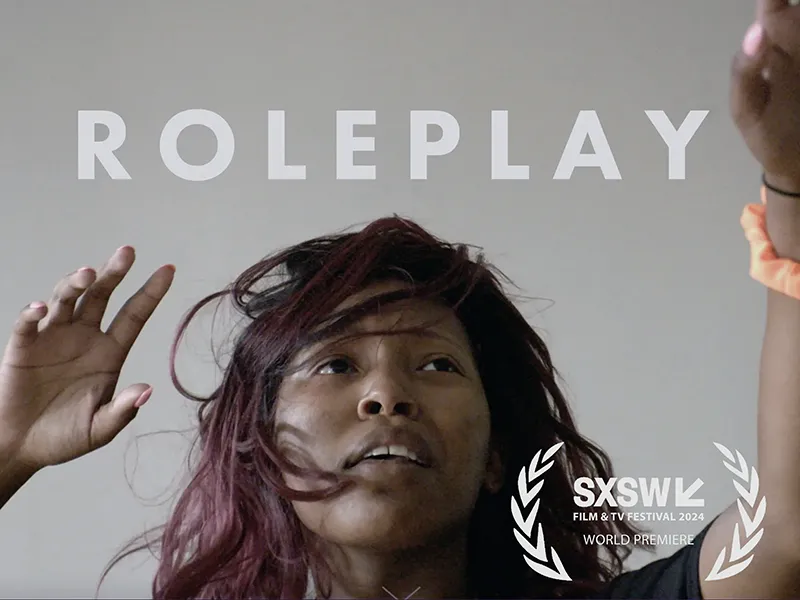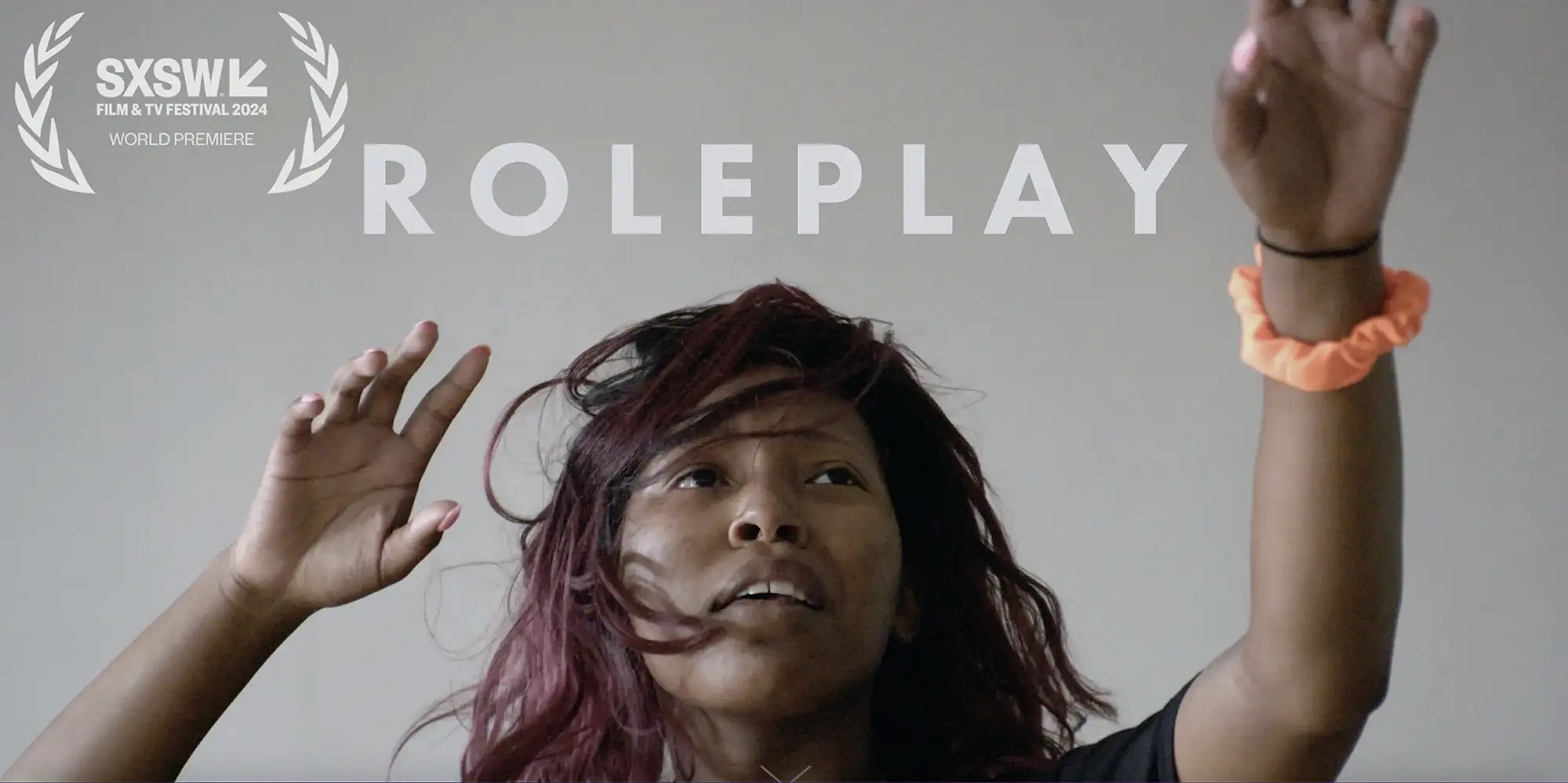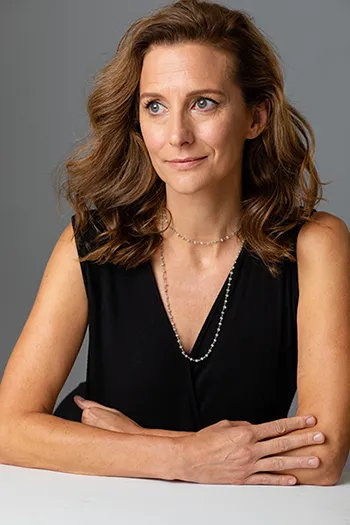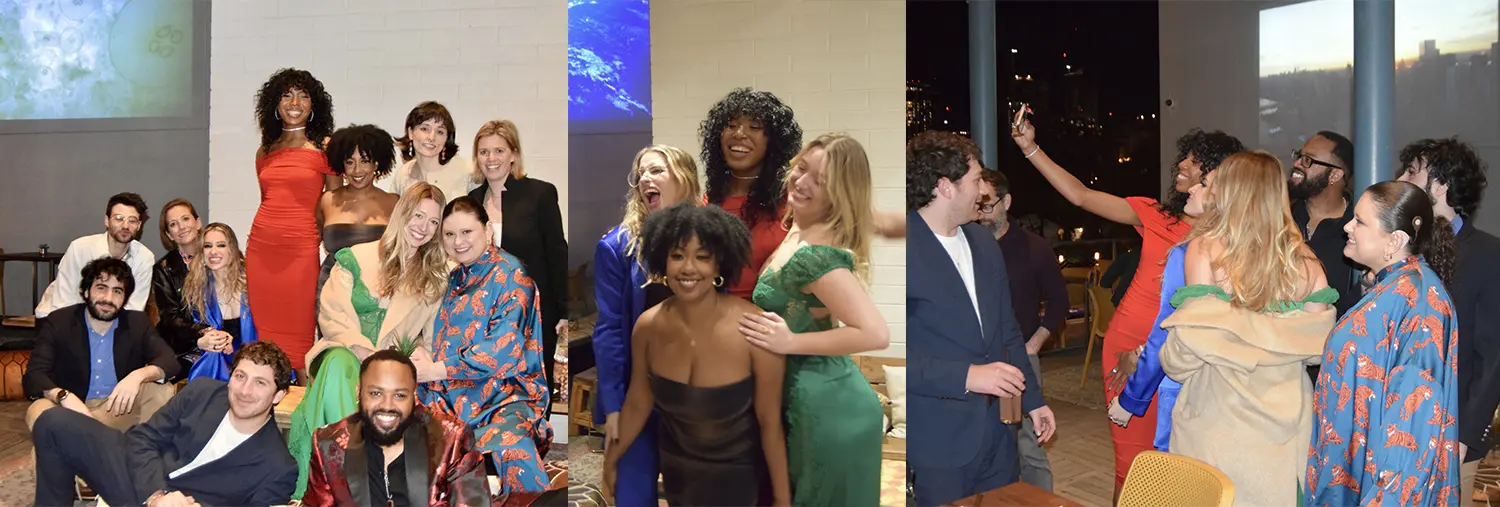

In a powerful showcase at SXSW 2024 in March, a group of recent alumni of the performing arts and digital media practices at Tulane University’s School of Liberal Arts stepped into the spotlight for the world premiere of a documentary based on their own original collegiate play. Roleplay is a 90-minute feature film that captures the development of the theater project and how the process helped the play’s participants navigate their own experiences with on-campus sexual violence.
One of the best docs I’ve seen so far this year is Katie Mathews’ Roleplay, a film that truly surprised me because it does what so few films like this are willing to do: It lets its subjects be messy, unpredictable, and human. Mathews has a deceptively subtle voice as a director, providing a supportive platform more than insisting on cinematic results. It leads to a film that’s all the more powerful by virtue of feeling so very real.
— Brian Tallerico, rogerebert.com

and Roleplay producer Jenny Mercein.
The play’s initial iteration came in response to Tulane University’s 2017 Climate Survey on Sexual Misconduct, whose findings charged administration and community members alike to reckon with the prevalence of on-campus sexual misconduct. In distressed response, the project began as a transformative act — not merely a piece of theatre, but a collective assessment and bold step toward healing and understanding. The development of the play’s script was a collaboration between then Adjunct Professor Darci Fulcher (now producer), filmmaker Katie Mathews (director, producer), and Assistant Professor of Theatre Jenny Mercein (producer), alongside fifteen undergraduate students and in partnership with Goat in the Road Productions.
Roleplay’s documentary debut and after party at the annual Austin festival marked a pivotal moment, where unaffiliated audience members were captivated by the doc's unique approach of mixing verité campus life footage with the raw, confessional space of the rehearsal room. The narrative film explores the creation of a performance script, born from the real-life experiences of its students during their sophomore year, and spurred by the university’s climate survey. From project start, the creators intentionally blurred the lines between reality and performance to bring viewers on a deeply personal, collective journey of understanding and action.
“What makes Roleplay so powerful and unique is the nuanced, intersectional lens of the film, which is a direct result of the students who created the project. These students understood that you cannot fully understand the problem of sexual violence and harassment without examining issues such as racism, homophobia, mental health struggles, and substance abuse,” said executive producer Jenny Mercein, also Assistant Professor of Theatre at Tulane. “I am deeply inspired by this generation of artists who helped us see that to understand and shift a culture that supports toxic behavior, we needed to explore the grey areas of complicity and consent where answers are not easy. These brave students led with vulnerability and authenticity, resulting in a film of undeniable power.”
“I first approached the process of creating the stageplay thinking I knew what I needed already —I understood the ‘black and white’ of so many things,” shared Aaron Avidon (SLA ’21), who played Lachlan. “But as I grew through the process of creating, I discovered how deeply nuanced the concepts we were approaching were. I grew to better understand myself, my role in a community, and how I can be the best ally for the people around me.”
Most of the original Roleplay cast — Avidon, Carl “CJ” Briggs Jr., Ross Brill, Alexandra Elam, Hannah Gordon, Grace Harmon Graugnard, Robert Holmes-A’court, Miranda Jo Kramer, Nagelle LeBoyd, Hailey Mozzachio, and Lucy Sartor — sat in the theater’s back row, reunited for the first time since their time together as students. The group collectively laughed, cheered, and gasped along with the crowd, emotional to finally see their work on a big, festival screen.
Noted Kramer (SLA ‘21), who played the role of Elle, “Roleplay allowed me to access things I had shoved down, offer myself compassion, and learn how to show up for others. It altered the way I saw myself on campus and inspired me to continue to pursue performance-based work as a force for change.”
The stage play explored student experiences with love, sex, power, and consent, and its first mounting enjoyed a sold-out run in 2019 — with the original cast winning the Big Easy Theatre Award for ‘Best Ensemble’. It was remounted in 2023 as part of the university’s sophomore strategic plan — All In 2.0 — following the 2022 survey. And the Roleplay reach has since expanded, in both formats. In mid-April, it was one of three films featured at the Yale Student Film festival, followed by a post-screening conversation moderated by Yale Communication and Consent Educators at the Ivy League university. And Louisiana State University is full steam ahead on its own production, with an LSU Theatre mainstage undergraduate production opening on their Baton Rouge campus in March 2025.
The film needs to be standard viewing at every university. The issues are discussed and confronted by the students themselves and in their own words and voices, which brings unmistakable sincerity to the message.
— Chris Hernandez, Film Speak
Alongside their commitment to supporting future productions of Roleplay at Tulane, the university’s administration has gone “All In” to combat sexual violence with a 2.0 action plan. Developing training for faculty, staff, students, employees, and leaders, offering grants to student-led projects that address sexual misconduct, funding three graduate assistant positions focused on prevention and outreach for graduate and professional student populations, and piloting a new intervention for students who have engaged in sexual misconduct, the refreshed initiative is thorough and tactical. Additional information on “All In” resources can be found on Tulane's “All In” website.
Added Title IX Associate Director, Julia Broussard, “We know that sexual violence prevention and education is most effective when a variety of different methods are used to inform and engage students, and Roleplay is such an innovative way to educate our students about sexual violence on campus — and to hopefully spark important, meaningful conversations. We’re so happy to be able to support it and heartened by all the positive feedback we’ve heard from students, employees, and community members about its impact.”
Roleplay is more than a play, or a film — it's a call to reflect, act, and change. As we celebrate the achievements of the students and faculty involved in bringing this project to life, we are reminded of the need for ongoing discussions and efforts to foster a safer, more inclusive campus environment at Tulane and across universities nationwide.

Meet the Cast
Aaron Avidon (SLA ’21) — Student Writer/Performer, “Lachlan”
- Major: Communication
- Minor: Strategy, Leadership & Analytics Minor (SLAM)
Since Graduating: Living in New York, working in sales at 237 Global, a company focusing on VIP experiences in the touring music space, while also managing an NYC-focused music news/live event review site called Think Break.
“I first approached the process of creating the stageplay thinking I knew what I needed already, that I understood the ‘black and white’ of so many things. But as I grew through the process of creating, I discovered how deeply nuanced the concepts we were approaching were. I grew to better understand myself, my role in a community, and how I can be the best ally for the people around me. I look back on the time spent working on Roleplay incredibly fondly and even now, almost 6 years later, I still find myself looking to it as a source of inspiration and guidance through every facet of my life.”
Carl Briggs, Jr. (B, ’20) — Student Writer/Performer, “George”
- Major(s): Management
- Minor: Theatre Performance
Since Graduating: Working at Tulane! Senior Program Coordinator of Student Programs for the Lepage Center, and in the beginning stages of writing his own film, while also collaborating on current campus productions including Only Miracles .
“Creating the stageplay was a test in vulnerability, trust, collaboration, problem solving, and outreach. I grew in empathy and declined in judgment. The documentary showed me that I was important, even if I felt overlooked while on campus. LSU has plans to put the stageplay on this upcoming year. My hope is that the small ripples that we have made already will grow to become massive waves of change that move all across this country.”
Alexandra J. Elam (SLA ’20) — Student Writer/Performer, “Kat”
- Major(s): Digital Media Production, English
Since Graduating: Staying busy in entertainment and media in Los Angeles, having worked as a showrunner’s assistant for BET, where she was promoted from executive assistant to staff writer for the penultimate episode of season two of Sacrifice . Recently completed work in technical operations at the NFL Media West Office, continuing to write, act, and create.
“When I first started on my journey with creating the play, I was someone who was unsure of myself and my role on campus. I was a junior who just wanted to make it to graduation unscathed. More importantly, I did not feel as though my voice was of any value to anyone. The experience I gained from participating in such a moving project was a personal and professional growth journey. Roleplay pushed me to be more empathetic in all aspects of my life thanks to the guidance of Katie, Goat in the Road, Jenny, and our team. Looking back on the film at SXSW left me feeling nostalgic about how far we have come and hopeful about where we are going.”
Hannah Gordon (SLA ’21) — Student Writer/Performer, “Nikki”
- Major(s): Communication, Digital Media Production
Since Graduating: Living in London, where she recently earned her masters in Film Directing, writing and directing her own short films while working as a PA and assistant director with companies like Amazon Studios, Disney+ and BBC.
“Those who have seen the doc and play know both my character and I have endured a tumultuous journey. Being a part of Roleplay grounded me during my toughest times and allowed me to transmute my hardships into something creative and meaningful. By embracing vulnerability and unabashed truth, I hope that I can be a voice for those who want to tell their story and help others feel not as alone. Being at SXSW was truly a dream come true, reconnecting with the AMAZING cast and crew and getting to see everyone' hard work come to fruition filled me with such pride and joy!”
Grace Harmon Graugnard (SLA ’20) — Student Writer/Performer, “Kayla”
- Major: International Relations, Theatre
- Since Graduating: Back at Tulane! Administrative Programming Coordinator at the Stone Center for Latin American Studies at Tulane, and an ensemble member of Goat in the Road Productions — the same company that directed our play. Planning to facilitate, write, and produce media that engages with disability and the nuanced Gulf South.
Miranda Jo Kramer (SLA ’21) — Student Writer/Performer, “Elle”
- Major: Theatre Performance Major
Since Graduating: Currently pursuing her MFA in Devised Theatre at the Pig Iron School via University of the Arts in Philadelphia, having been heavily influenced to further pursue ensemble-based, physically-driven performance!
“Undergrad can be such a difficult time. It was for me. Getting to create this play and collaborate with my peers (now close friends) gave me the space to continue to discover and embrace my queerness, and challenge my preconceived notions. Roleplay allowed me to access things I had shoved down, offer myself compassion, and learn how to show up for others. It altered the way I saw myself on campus, and inspired me to continue to pursue performance based work as a force for change. SXSW was a dream, and I can't wait to see what else comes from what everyone so graciously and lovingly poured into this project.”
Nagelle LeBoyd (SPHTM ’19) — Student Writer/Performer, “Zoe"
- Major: Public Health, Theatre Performance Major
- Minor: Theatre Performance
- Graduate: MPH - Maternal and Child Health, 2021
- Since Graduating: Living in New Orleans, working as a research assistant with the Special Education Policy and Practice team at WestEd, a national nonpartisan, nonprofit research, development, and service agency.
Lucy Sartor (SLA ’22) — Student Writer/Performer, “Megan”
- Major(s): Digital Media Production, English
- Minor: Theatre Performance
Since Graduating: Living in Los Angeles, working as an Assistant to Partner and Head of Television at Creative Artists Agency in Los Angeles, with aspirations to write, produce, and perform in her own stories.
“As a theatrical production, Roleplay brought together students from every Tulane demographic. We united in the cause to make something that simultaneously illuminated the casual and covert ways assault culture operates on college campuses, while remaining entertaining, accessible, and authentic to the current student experience. Watching it all back 5 years later is surreal: the documentary is a testament to the vulnerability and honesty of our younger selves, cultivated by the supportive environment.”
Cameron Woodle (SLA ’21) — Assistant Camera
- Major(s): Digital Media Production, Communication
- Since Graduating: Recently returned to New Orleans to be the Director of Video Production at a local marketing company. Also studying to become a VFX artist working on creative personal projects on a freelance basis.
James Weiss (SLA ’19) — Student Writer
- Major: Theatre Performance
- Minor: Business
Since Graduating: Has worked for Leo Burnett, Beirut, as a copywriter, organizing unions with fellow Starbucks colleagues, supporting Jamaal Bowman’s and Bernie Sanders’ campaigns, and working with the Census Bureau under the U.S. Department of the Treasury. Living in New York and exploring opportunities as a writer, an actor, a programmer, a translator.
“I did not have any expectations going into Roleplay since I wasn't really sure what the goal of the project was. Broadly, I thought Roleplay was supposed to be about the life of college kids; looking back, I realize now that the topic of college kids cannot accurately be depicted without the discussion of assault, racism, and systems that perpetuate the same status quo altogether. The passion of my peers helped reinforce my belief in the importance of these sorts of discussions.”

